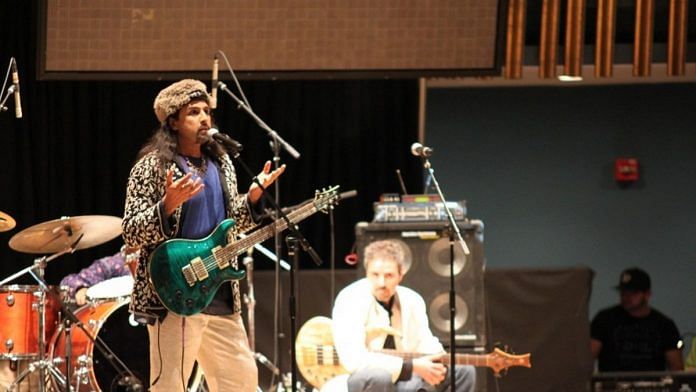Two decades after it was banned in Pakistan, Sufi rock band Junoon is set to perform in Karachi today.
New Delhi: In 1998, former Pakistan prime minister Nawaz Sharif banned the country’s most iconic Sufi rock band, Junoon, also known as “U2 of Pakistan”. Two decades later, the tables have turned.
On Tuesday, Junoon is set to make a comeback with a Christmas concert in Karachi after a 13-year long hiatus, while Sharif is facing a 10-year jail term, apart from a permanent ban in the Parliament.
The concert is being organised at the DHA sports club of Karachi by Biscuit maker Peek.
“We’re all sold out & twice the number of people still want these tickets. Will have to add more dates for Pakistan,” band member Salman Ahmad tweeted Sunday.
The loyal fans have paid up anywhere between Rs 3,000 and Rs 7,500 for tickets.
Sound Check is also done! now waiting for this evening for #SooperJunoon concert pic.twitter.com/w8h0f2D068
— Hamadullah Sohu (حمادالله سوھو) (@hsohu) December 25, 2018
Whether in Pakistan or India, the millennial kids from ’90s remember listening to Sayonee, the band’s most popular song, on radio or music channel MTV, and passionately singing along to “Chain ik pal nahi, Aur koi hal nahi”.
The decade was marked by Junoon’s reign that brought in the fusion wave in south Asia.
Also read: Ko Ko Korina: Why Pakistan is decrying a Coke Studio cover
Where it all started
The band rose to fame soon after they released their debut album, Junoon, in 1991.
However, its history goes back to New York where founder and songwriter Salman Ahmad became friends with American bassist Brian O’Connell during high school. Ahmad then moved back to Lahore to study medicine.
Initially, the band comprised Ahmad, lead singer Ali Azmat, and guitarist Nusrat Hussain.
Hussain quit the band after soon after to pursue his solo career.
Ahmad then approached his old friend O’Connell with the offer to play bass for the band’s second album. O’Connell accepted the offer, quit his job and flew down to Pakistan to be a part of the band. Their journey gained them massive success not just in Pakistan but internationally as well.
Fame and success
Junoon’s 1993 album Talaash grabbed Pakistan’s attention instantly. It gripped the youth with its political lyrics and also faced censorship. The title song was eventually banned by the government.
However, the album got Junoon critical success all over south Asia. The band didn’t cut out the political strain from its music and continued to take jabs at the Pakistani elite, like late prime minister Benazir Bhutto.
On its first tour around US in 1997, the band released its fourth album Azadi which featured the song Sayonee, a smash hit in India as well.
Junoon tasted its first big-scale success in India when it was invited to perform at Bollywood’s Zee Cine Awards in 1998. The band went on to tour the country the same year.
Ban
The band members were interviewed extensively during their tour in India at a time when there was severe tension between the neighbours over the Pokhran nuclear tests.
In one interview which appeared on national and international news channels, Ahmad suggested to Pakistani leaders to spend more on education than weapons of mass destruction.
Pakistan’s Nawaz Sharif government of the time responded by slapping a ban on the band from performing in the country. It also banned Junoon’s music from being aired on Pakistani media.
The country’s cultural ministry also charged the band with “sedition and treason” for challenging the national opinion on Pakistan’s nuclear tests.
Junoon, however, continued its rebellion by performing at closed-door events and critiquing the country’s politics.
It received several international awards, including the BBC Award for contribution to Asian culture in 1998.
Also read: Remembering Sahir Ludhianvi, the rare ‘poet’ among Bollywood lyricists
Regroup
The trio decided to part ways in 2005 after their last album Dewaar. O’Connell moved back to US while Azmat went on to pursue his solo musical career.
Ahmad continued with Junoon and performed with instrumentalists. In 2010, he published a book titled Rock and Roll Jihad: A Muslim rockstar’s revolution.
In 2010, Azmat was seen in the first episode of music entertainment show Coke Studio alongside Rahat Fateh Ali Khan performing viral hit Garaj Baras.
Several attempts were made to reunite the band by their fans and international brands like Coca Cola and Pepsi, but it never worked out due to creative differences between Ahmad and Azmat.
However, in August this year, Peek Freans Sooper pulled off a coup and as a “Christmas miracle”, the band decided to come together once again and perform for Pakistan, reigniting musical nostalgia all over.
In January, the band is set to perform in Dubai.



